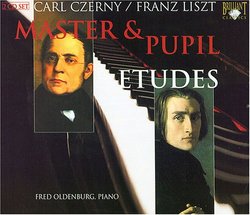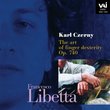| All Artists: Carl Czerny, Franz Liszt, Fred Oldenburg Title: Carl Czerny, Franz Liszt: Master & Pupil (Etudes) Members Wishing: 0 Total Copies: 0 Label: Brilliant Classics Release Date: 3/29/2005 Genre: Classical Styles: Chamber Music, Historical Periods, Classical (c.1770-1830) Number of Discs: 2 SwapaCD Credits: 2 UPC: 675754824228 |
Search - Carl Czerny, Franz Liszt, Fred Oldenburg :: Carl Czerny, Franz Liszt: Master & Pupil (Etudes)
 | Carl Czerny, Franz Liszt, Fred Oldenburg Carl Czerny, Franz Liszt: Master & Pupil (Etudes) Genre: Classical
|
Larger Image |
CD DetailsSimilar CDs |
CD ReviewsUnassailable Rembrandt Q. Einstein | NY | 03/22/2006 (5 out of 5 stars) "In offering my praise of this duel CD it's hard to know where to begin. First I suppose I should mention the flawlessness of the playing. Fred Oldenburg (whoever that is) is superb. There is not a wrong note to be heard on either CD. I find the level of technical competency to be fascinating. This CD was a tremendous undertaking for one pianist. As an amateur pianist myself, I can say with great certainty that to play Czerny's "Art of Finger Dexterity" properly is no small task, even for professionals. And Liszt's Transcendental Etudes are universally considered some of the most fearsome pieces ever written for solo piano. Yet both are presented here flawlessly. So bravo to Fred Oldenburg.
Second, I shall briefly touch upon the recording quality. All that I really can say is that is it also excellent, and just serves to further compliment the playing. I could easily hear every note with distinct and brilliant clarity. The sonic effect was perfectly streamlined throughout. Third, this set is very well put together. With Czerny and Liszt you have the champions of two distinct schools, even though Czerny taught Liszt. Those distinctions could not be clearer when listening to these CD's. Czerny's etudes are pedagogical and systematic (some would say cold and unfeeling). They are brilliant though whatever you believe. Czerny did not add needless ornamentation. That is not to say though that he was simplistic, since they are fiendishly difficult. He represents probably the epitome of the "old school" of etude composition. Czerny's great masterpiece is aptly called "The Art of Finger Dexterity" for a reason. If you complete all the studies within, your fingers will be most dexterous. And that is all Czerny seeks to accomplish. Many who listen to "The Art of Finger Dexterity" may be put off by the admittedly narrow focus of its aims, and as my father says, a somewhat "grating quality." But it is truly a historical piece. Czerny's etudes would serve as the musical backbone, in one way or another, for virtually every other solo piano piece written for the next 50 years. And to transition, it would be impossible to play Liszt's Transcendental Etudes (which were dedicated to Czerny) without first mastering "The Art Finger Dexterity." The Transcendental Etudes are actually not a revolution as much as they an evolution, albeit a very great evolution. For Liszt did not, throw out the past conventions of his teacher, but rather built upon them. Liszt approaches the etude quite differently to Czerny, in fact he redefines them. The Czerny etude was principally a study piece. They were meant for moderately advanced students to learn so they could move on to greater pianistic challenges. Liszt's Etudes are far removed from that mold. (Certainly no piano student I know ever takes up the Transcendental Etudes as study pieces). They are meant to be played by only the foremost pianists in the world. They don't just have ornamentation, they glory in them. Liszt adds every little frill he can. They are etudes written outside the realm of pedagogy. And that is the critical difference. Listening to the Czerny and then the Liszt respectively allows the listener to delight in the aforementioned progression. Both from an analytical and casual listening standpoint, this set has provided me with endless enjoyment. For only $12.00 it's unassailable in every way Highly Recommended Rembrandt Q. Einstein " |

 Track Listings (30) - Disc #1
Track Listings (30) - Disc #1